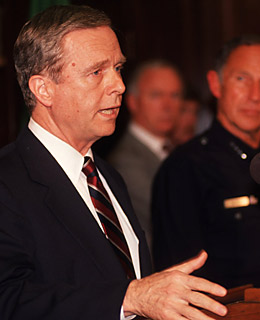
Governor Pete Wilson speaks to the media May 1, 1992 in Los Angeles, CA.
Once he heard about the trouble spinning out of control in South Central Los Angeles, one of the first things Gov. Pete Wilson did was to head into the heart of the besieged neighborhood to meet with Mayor Tom Bradley and other community leaders at the outset of the riot. When Bradley declared a state of emergency by 7 p.m. Wilson ordered 2,000 California National Guardsmen into the city and eventually doubled that number. But the Guard didn't establish itself and take control of the situation in L.A. until more than 24 hours after the riots started, because it was short of ammunition, and wasn't properly equipped with basics like flak jackets, batons and riot shields. On the third day of the riot, Wilson toured the city with President Bush, who declared it a federal disaster area. As Wilson recalled in a 2000 Harvard University study, the mayhem of those days, especially the attack on trucker Reginald Denny, "was an ugly scene and the viciousness and violence were unnerving...it scared the hell out of a lot of people."
After the mayhem had subsided, Wilson was left in a political conundrum. The mayor and police chief were not talking, 53 people were dead and $1 billion in damage had been done. He needed to find solutions. A few days after the last fire was put out, Wilson and Bradley approached baseball commissioner Peter Ueberroth to lead a community restoration effort called "Rebuild L.A," which fostered grassroots investment, job training, and capital access improvement efforts. It initially attracted $1 billion in investment committments from 500 companies for the damaged areas. But only $382 million of it actually came through, not nearly enough to repair the damage. The organization's five-year charter ended in 1997 and it was succeeded by a group called LA PROSPER Partners, which is run through the Los Angeles Community College District.
After an unsuccessful presidential run in 1996, Wilson returned to private life, working for and serving on the boards of a number of banks and businesses. He currently works for the Bingham Consulting Group and is a visiting fellow at the Hoover Institution, a conservative think tank.
—Jesse Singal